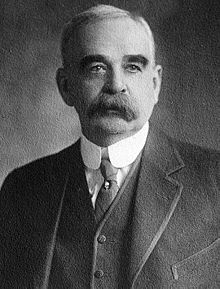Willard Saulsbury Junior
Willard Saulsbury Jr. (born April 17, 1861 in Georgetown , Delaware , † February 20, 1927 in Wilmington , Delaware) was an American politician ( Democratic Party ) who represented the state of Delaware in the US Senate .
Life
Saulsbury came from a family of politicians. His father Willard Saulsbury and his uncle Eli May Saulsbury already held the class 2 senatorial seat in Washington , which he would later take over.
After attending private schools and the University of Virginia in Charlottesville , he studied law , was admitted to the bar in 1882 and began to practice as a lawyer in Wilmington. He later also became president of the New Castle County Bar Association and served on the local Board of censors .
politics
As an influential member of his party, Saulsbury was a member of the Democratic National Committee from 1908 to 1920 . In 1899 he made the first attempt to be elected to the Senate, but failed, as did his subsequent five attempts. It was not successful until 1913 and entered Congress on March 4 of that year . During his six-year term of office, he was chairman of several committees and served as Senate President pro tempore between December 1916 and March 1919 .
After the 17th Amendment to the Constitution came into force , the US Senators were no longer elected by the respective state parliaments, but by the people from 1914 onwards. Saulsbury had to face this election in 1918, with 48 percent of the vote losing to Republican Lewis Heisler Ball , who achieved 51 percent. Thus, Willard Saulsbury had to leave the Senate in March 1919. He then worked again as a lawyer in Wilmington and Delaware; He also took part in the disarmament conference in Washington in 1921 and 1922 and in the Pan-American conference in Santiago de Chile in 1923.
Web links
- Willard Saulsbury junior in the Biographical Directory of the United States Congress (English)
- Willard Saulsbury junior in the database of Find a Grave (English)
- The Senators from Delaware
| personal data | |
|---|---|
| SURNAME | Saulsbury, Willard Jr. |
| ALTERNATIVE NAMES | Saulsbury, Willard Jr. |
| BRIEF DESCRIPTION | American politician |
| DATE OF BIRTH | April 17, 1861 |
| PLACE OF BIRTH | Georgetown , Delaware |
| DATE OF DEATH | February 20, 1927 |
| Place of death | Wilmington , Delaware |


